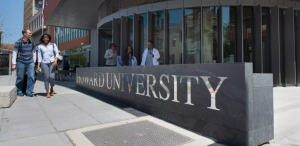
By: Sidney Johnson, News Reporter (@afamilycompany_)
The Department of Education recently announced the placement of Howard University on the department’s “Heightened Cash Monitoring 2” status. This announcement was made in August 2018, but the school has been under review for months before their addition to the list.
Years before the “financial aid scandal” of 2018, students have voiced concerns and complaints about the managing of funds, scholarships and grants through the Financial Aid department of Howard University. Those complaints seemingly reached a peak as students took hold of the Administrative building in Spring 2018, though the crisis was only an addition to a long list of other demands.
“The services that Howard offers and their budgeting is already questionable, so this will only make living here and being a student here more uncomfortable,” said Jorden Mullings junior broadcast journalism major.
As the nine day sit-in came to a close for Howard University and Howard University students on April 6, the Department of Education began their investigation of Howard later that month “following the public dissemination of information regarding the internal investigation of misappropriation of funds in our financial aid office” according to President Wayne A.I. Frederick. That investigation in April of 2018 revealed the information that led to the school’s placement on the Department of Education’s HCM2 list.
When questioned on the specific reasoning for Howard University’s new status, President Frederick said “I am not sure why” according to the Washington Post. On the other hand, the Department of Education stated that “the issues include, among other things, a lack of internal controls, the failure to reconcile Title IV disbursements, the failure to reconcile account records, the failure to ensure students begin attendance and are eligible to receive Title IV funds, the failure to separate the functions of authorizing and disbursing Title IV funds, and the failure to follow Title IV credit balance requirements” in an open letter.
Title IV is in reference to federal financial aid funding and programs. Title IV programs include federal grants, loans and work study.
Schools on the HCM2 list do not receive funds from the government in advance. They must award Financial Aid and provide proper documentation to request the federally backed money afterwards.
In a letter to the Howard University Community, President Frederick discussed the improvements that the school has made since the investigation began in April. The improvements include the hiring of new Director of Financial Aid Angelika Williams and internal Financial Aid Compliance Officer Mustafa Hersi, the implementation of an outside firm to take on tasks that will improve financial aid services, and the training of Financial Aid staff on updated procedures.
President Frederick states that the university is “taking all necessary measures to avoid any adverse impact on students” in his letter, but is this most recent dent on the beloved University’s reputation already beginning to have an effect on the students?
“I came here for the HBCU experience. There’s the stereotype that black people don’t have their stuff togeether. I was hoping that wouldn’t be true but in this case it’s looking to be true. It’s very disappointing,” said Gary Stewart, junior marketing major.
The university’s status will remain a point of interest and debate as students feel the effects of being monitored.









